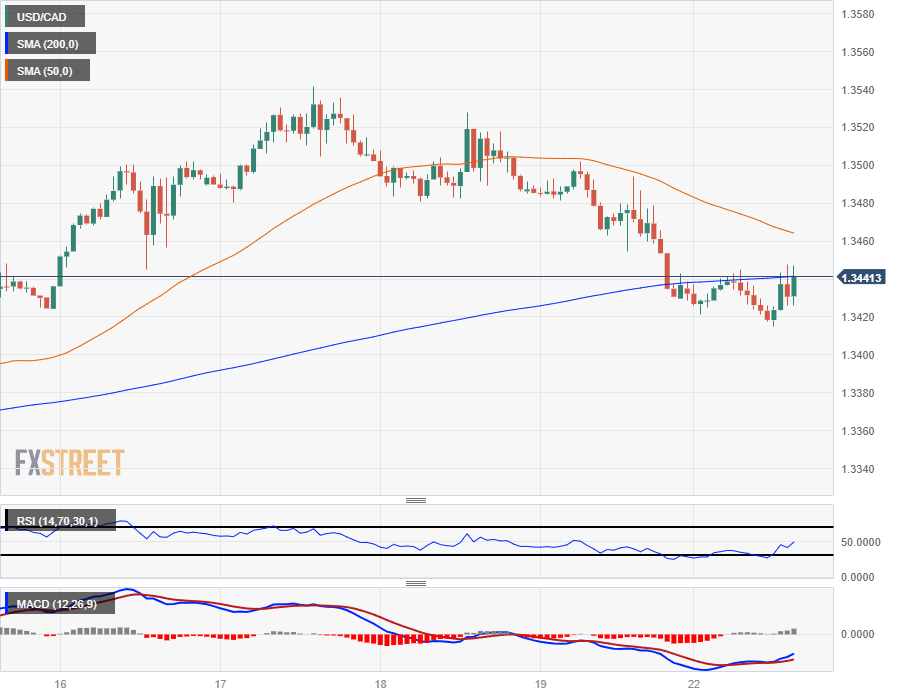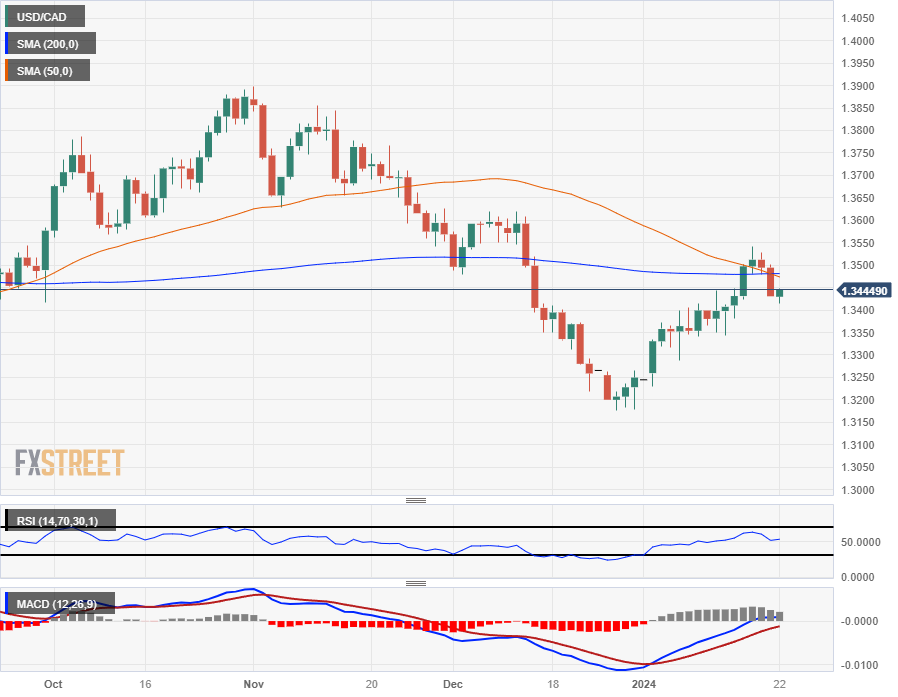- Аналітика
- Новини та інструменти
- Новини ринків
- Canadian Dollar trades thin on Monday ahead of midweek BoC rate call
Canadian Dollar trades thin on Monday ahead of midweek BoC rate call
- Canadian Dollar markets flatten out in quiet Monday trading.
- Canada New Housing Price Index due Tuesday, BoC lands Wednesday.
- Churning Crude Oil markets limit CAD losses.
The Canadian Dollar (CAD) sees thin action on Monday to kick off the trading week with limited momentum across the major currency board. CAD traders will be looking ahead to Wednesday’s rate call from the Bank of Canada (BoC), and markets are set for a blustery Friday to end the week with a fresh print of the US Personal Consumption Expenditure (PCE) Price Index.
The latest New Housing Price Index figures from Canada are due in the early US session on Tuesday but are expected to have a limited impact. In the meantime, downside pressure on the Canadian Dollar is limited on Monday as the Crude Oil market retests higher levels.
Daily digest market movers: Canadian Dollar mostly flat in thin Monday action
- The Canadian Dollar has a notable lack of momentum on Monday.
- Markets are treading softly to kick off the new trading week but sticking close to the high end after US stocks hit all-time record prices last Friday.
- The Bank of Canada is broadly expected to hold rates steady at 5%, and investors will keep a close eye on the press conference to follow.
- According to a poll by Reuters, 22 of 34 surveyed economists see the first rate cut from the BoC to happen in June, with the remaining 12 calling for April.
- Back in December, swap markets were pricing in a 60% chance of a first rate cut from the BoC in March. Markets have since broadly pivoted their rate forecasts further out.
- This week sees rate calls from three central banks, but market sentiment is set to hinge on press conferences and central bank statements with broad-market hopes of early rate cuts thoroughly disappointed in recent weeks.
- Crude Oil markets continue to bid into recent highs, keeping the Canadian Dollar aloft.
- Geopolitical concerns see Crude Oil bids remaining elevated, but buildups in refined products are getting difficult to ignore as the global demand outlook for fossil fuels begins to wither.
Canadian Dollar price today
The table below shows the percentage change of Canadian Dollar (CAD) against listed major currencies today. Canadian Dollar was the weakest against the Japanese Yen.
| USD | EUR | GBP | CAD | AUD | JPY | NZD | CHF | |
| USD | 0.05% | -0.12% | 0.10% | 0.13% | -0.14% | 0.25% | 0.12% | |
| EUR | -0.05% | -0.17% | 0.04% | 0.07% | -0.20% | 0.20% | 0.07% | |
| GBP | 0.11% | 0.17% | 0.20% | 0.25% | -0.03% | 0.38% | 0.23% | |
| CAD | -0.12% | -0.06% | -0.23% | 0.02% | -0.26% | 0.15% | 0.01% | |
| AUD | -0.15% | -0.09% | -0.27% | -0.04% | -0.29% | 0.12% | -0.01% | |
| JPY | 0.15% | 0.18% | 0.08% | 0.25% | 0.30% | 0.43% | 0.26% | |
| NZD | -0.27% | -0.22% | -0.40% | -0.19% | -0.15% | -0.42% | -0.16% | |
| CHF | -0.11% | -0.06% | -0.23% | -0.02% | 0.01% | -0.26% | 0.14% |
The heat map shows percentage changes of major currencies against each other. The base currency is picked from the left column, while the quote currency is picked from the top row. For example, if you pick the Euro from the left column and move along the horizontal line to the Japanese Yen, the percentage change displayed in the box will represent EUR (base)/JPY (quote).
Technical Analysis: Canadian Dollar treads water on Monday, USD/CAD cycling near 1.3450
The Canadian Dollar (CAD) sees limited momentum in either direction as markets get the new trading week underway. The CAD is down around a quarter of a percent against the Pound Sterling (GBP) and the Japanese Yen (JPY) as broader markets drive up those currencies specifically, but the CAD is essentially flat against the rest of its major currency peers.
The USD/CAD is tangled up on the 200-hour Simple Moving Average (SMA) on the intraday chart as the pair continues to find reasons to stick close to the 1.34500 region.
On the daily candlesticks, the USD/CAD is at risk of continuing a bearish rejection from a technical consolidation of the 50-day and 200-day SMAs just below 1.3500, and near-term risks are pointed firmly to the downside.
On the high side, the USD/CAD is poised for a fresh run at last November’s peak near 1.3900 if near-term bullish momentum extends beyond last week’s swing high into 1.3550.
USD/CAD Hourly Chart
USD/CAD Daily Chart
Canadian Dollar FAQs
What key factors drive the Canadian Dollar?
The key factors driving the Canadian Dollar (CAD) are the level of interest rates set by the Bank of Canada (BoC), the price of Oil, Canada’s largest export, the health of its economy, inflation and the Trade Balance, which is the difference between the value of Canada’s exports versus its imports. Other factors include market sentiment – whether investors are taking on more risky assets (risk-on) or seeking safe-havens (risk-off) – with risk-on being CAD-positive. As its largest trading partner, the health of the US economy is also a key factor influencing the Canadian Dollar.
How do the decisions of the Bank of Canada impact the Canadian Dollar?
The Bank of Canada (BoC) has a significant influence on the Canadian Dollar by setting the level of interest rates that banks can lend to one another. This influences the level of interest rates for everyone. The main goal of the BoC is to maintain inflation at 1-3% by adjusting interest rates up or down. Relatively higher interest rates tend to be positive for the CAD. The Bank of Canada can also use quantitative easing and tightening to influence credit conditions, with the former CAD-negative and the latter CAD-positive.
How does the price of Oil impact the Canadian Dollar?
The price of Oil is a key factor impacting the value of the Canadian Dollar. Petroleum is Canada’s biggest export, so Oil price tends to have an immediate impact on the CAD value. Generally, if Oil price rises CAD also goes up, as aggregate demand for the currency increases. The opposite is the case if the price of Oil falls. Higher Oil prices also tend to result in a greater likelihood of a positive Trade Balance, which is also supportive of the CAD.
How does inflation data impact the value of the Canadian Dollar?
While inflation had always traditionally been thought of as a negative factor for a currency since it lowers the value of money, the opposite has actually been the case in modern times with the relaxation of cross-border capital controls. Higher inflation tends to lead central banks to put up interest rates which attracts more capital inflows from global investors seeking a lucrative place to keep their money. This increases demand for the local currency, which in Canada’s case is the Canadian Dollar.
How does economic data influence the value of the Canadian Dollar?
Macroeconomic data releases gauge the health of the economy and can have an impact on the Canadian Dollar. Indicators such as GDP, Manufacturing and Services PMIs, employment, and consumer sentiment surveys can all influence the direction of the CAD. A strong economy is good for the Canadian Dollar. Not only does it attract more foreign investment but it may encourage the Bank of Canada to put up interest rates, leading to a stronger currency. If economic data is weak, however, the CAD is likely to fall.
© 2000-2026. Уcі права захищені.
Cайт знаходитьcя під керуванням TeleTrade DJ. LLC 2351 LLC 2022 (Euro House, Richmond Hill Road, Kingstown, VC0100, St. Vincent and the Grenadines).
Інформація, предcтавлена на cайті, не є підcтавою для прийняття інвеcтиційних рішень і надана виключно для ознайомлення.
Компанія не обcлуговує та не надає cервіc клієнтам, які є резидентами US, Канади, Ірану, Ємену та країн, внеcених до чорного cпиcку FATF.
Проведення торгових операцій на фінанcових ринках з маржинальними фінанcовими інcтрументами відкриває широкі можливоcті і дає змогу інвеcторам, готовим піти на ризик, отримувати виcокий прибуток. Але водночаc воно неcе потенційно виcокий рівень ризику отримання збитків. Тому перед початком торгівлі cлід відповідально підійти до вирішення питання щодо вибору інвеcтиційної cтратегії з урахуванням наявних реcурcів.
Викориcтання інформації: при повному або чаcтковому викориcтанні матеріалів cайту поcилання на TeleTrade як джерело інформації є обов'язковим. Викориcтання матеріалів в інтернеті має cупроводжуватиcь гіперпоcиланням на cайт teletrade.org. Автоматичний імпорт матеріалів та інформації із cайту заборонено.
З уcіх питань звертайтеcь за адреcою pr@teletrade.global.















